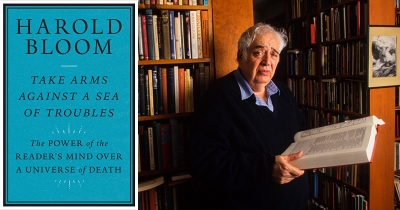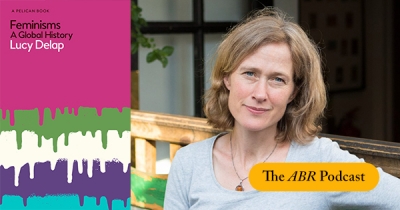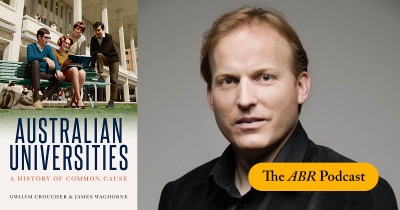Accessibility Tools
- Content scaling 100%
- Font size 100%
- Line height 100%
- Letter spacing 100%
Podcast
The ABR Podcast
Released every Thursday, the ABR podcast features our finest reviews, poetry, fiction, interviews, and commentary.
Subscribe via iTunes, Stitcher, Google, or Spotify, or search for ‘The ABR Podcast’ on your favourite podcast app.
Episode #187
‘why your hair is long & your stories short’
By Tracey Slaughter
With the publication of the May issue, ABR was delighted to announce the winner of the 2024 Calibre Essay Prize. Tracey Slaughter – from Aotearoa New Zealand – has become the first overseas writer to claim the Calibre Prize with her essay ‘why your hair is long & your stories short’. We are thrilled Tracey Slaughter could join the ABR Podcast to read her winning essay. Listen to Tracey Slaughter with ‘why your hair is long & your stories short’, published in the May issue of ABR.
Recent episodes:
Harold Bloom was one of the last of the so-called ‘Yale critics’, who shaped the terrain of literary criticism in the latter half of the twentieth century. Bloom died in October 2019, and his final book, Take Arms Against a Sea of Troubles, arrives two years after his death and caps a long and controversial career. In this issue, James Ley surveys this swansong by a critic who ‘came to style himself less as a theorist and more as a theologian of literature: the high priest and only admitted member of his own private religion’.
... (read more)African American Poetry is an ambitious and wide-ranging collection of Black poetry. Edited by Kevin Young, a fellow poet and poetry editor of The New Yorker, the collection spans contemporary writers such as the Pulitzer Prize-winner Jericho Brown to literary giants such as Langston Hughes, Gwendolyn Brooks, and Derek Walcott. As David Mason writes, 'It needs to be said and said again just how profoundly American this poetry is, how it enriches culture and should not be ignored among the more conventionally canonised.'
... (read more)Written by award-winning historian Lucy Delap, Feminisms challenges the obfuscating binaries of the 'feminist waves'. Its main focus looks into aspects of feminism that have often been in conflict or overlooked by contemporary movements. Zora Simic reviews the book for our current April issue, and describes it as ‘building on and acknowledging the work of those who came before, while bringing new ideas and energy to the task.' Listen to Zora read her full review in today's episode.
... (read more)Over the past year the pandemic has devastated the performing arts in Australia. Theatre especially has been adversely impacted. In today’s episode, theatre critic and ABR regular Tim Byrne looks at how theatre organisations are coping now that venues are beginning to reopen. He interviews a range of artistic directors spanning Melbourne Theatre Company’s departing Brett Sheehy, Queensland Theatre Lee Lewis, Malthouse Theatre’s Matthew Lutton, and many more.
... (read more)In the wake of Brittany Higgins's startling allegations of sexual abuse in Parliament House, Beejay Silcox revisits her review of Witness by award-winning journalist Louise Milligan. Witness (recently shortlisted in the 2021 Stella Prize) is an interrogative critique of the criminal trial process. It is the culmination of five years of research into how witnesses are treated (and often intimidated or worse) in court rooms.
... (read more)This week our subject is Cy Twombly, one of the most celebrated artists of the twentieth century. A new major exhibition of his work, Cy Twombly: Making Past Present, organised by the MFA in Boston and the Getty Museum in LA, surveys Twombly's immense debt to antiquity. Patrick McCaughey reviews the related catalogue for our upcoming April issue. In this wide-ranging conversation with Peter Rose, he also talks about the plight of US museums during the pandemic, the vexed question of de-accessioning, and the diaries of Fred Williams, which he is currently editing.
... (read more)This week we turn to My Octopus Teacher, a documentary that has proven controversial since its publication on Netflix in late 2020. As Anne Rutherford discusses in her luminous review, My Octopus Teacher follows the descent of Craig Foster, naturalist and filmmaker, into the briny world of a particular octopus. The documentary captures the burgeoning affinity between free-diver and cephalopod, prompting questions of anthropomorphism and to what extent humankind can establish a meaningful connection with the animal kingdom.
... (read more)In 2017, Kazuo Ishiguro won the Nobel Prize for Literature for his masterful novels, which, in the judges’ words, uncover 'the abyss beneath our illusory sense of connection with the world'. His new work, Klara and the Sun, is his first novel published since winning the Nobel Prize. In today's episode, Beejay Silcox discusses the novel and our expectations of the author, and reads in full her review which appears in ABR's March issue.
... (read more)Australian universities are doing it tough – hit hard by the pandemic, compelled to find new ways of teaching during lockdown, and confronted by a federal government ostensibly unsympathetic to much of their work, especially in the humanities. International education – formerly one of Australia’s most lucrative export industries – is haemorrhaging. In today's episode, Peter Tregear – academic, author, critic – reads his review of Australian Universities: A history of common cause by Gwilym Croucher and James Waghorne, published by UNSW Press.
... (read more)Paul Kildea is a man of many parts – author, musician, new artistic director of Musica Viva – and a regular contributor to ABR. In this week’s podcast, he talks to Peter Rose about the challenges of programming Musica Viva’s season during a pandemic and about Benjamin Britten, whose opera A Midsummer Night’s Dream is a highlight of the 2021 Adelaide Festival. Paul Kildea – who will conduct the opera – is the author of a biography of Britten.
... (read more)










